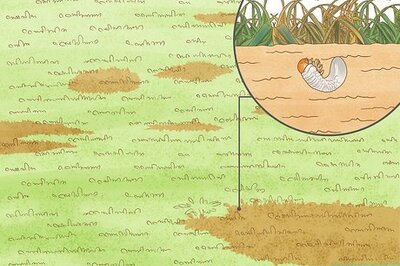
views
It is not only the 22 players, who make football the most beautiful game in the world, it is also those who sit in the commentary box and explain the game in the most poetic way. Peter Drury is one such person who spins magic with his words. In an exclusive interview with CNN-News18, the ‘football's poet' gives an insight into the world of commentary.
The celebrated commentator also shared his willingness to visit India and revealed, “There was a conversation, a few years back.”
When did it occur to you that you would become a sports commentator?
A: Well, I guess it was a childhood dream really, not a realistic one at all. From a very young age I used to pretend to commentate on games I played with my brothers, normal day-to-day household events but that was just the normal behaviour of childhood and growing up actually. And it really wasn't until I was leaving University and beginning a career, which was a very brief one as a trainee accountant, that I decided that I would pursue my dream. And I did, thanks to a few fortunate breaks along the way. I've managed to make my living out of it so far.
How did it feel to get your first break? Was it like a dream come true moment for you?
A: I suppose so, yes. I mean like many others, in this very competitive industry, I suffered a great deal of rejection as I had no back story, no suitable CV and no experience. Eventually, I got a chance as a sports reporter with a top agency in London and spent 2-3 years with them and then got a chance with BBC local radio in Yorkshire in the north of England and that's really where I began consistently to commentate and to learn the tools of the trade.
It would be an understatement to say that you are a wordsmith. But in the heat of the moment, how do you know that what you are saying is making sense?
A: I don't really. That's a very good question. It's the first time I've been asked that question. I don't know whether I'm making sense and sometimes I come up there and think I hope I make some sense there. The thing is, especially, at exciting moments, you are caught up in the atmosphere and the words that fly out of your mouth are purely instinctive. So, there's a large degree to which you're flying by the seat of your pants and hoping for the best and you're only ever a teeny, teeny bit away from something catastrophic or at least something nonsensical. In short, I don't.
Have you ever personally experienced the commentator's curse?
A: That can happen. Actually, it's more likely to happen to the co-commentator, the former player or manager who is sitting next to you. My job is simply to articulate what is going on. It is more often their job to give an opinion, so they are more inclined to speculate, which might lead to the commentator's curse. Don't get me wrong. I can make plenty of mistakes. I do and will continue to do every week of my professional life. But I am less likely to makes predictions because that isn't my job.
"Roma has risen from the ruins, Manolas the Greek God in Rome." Let's talk a bit about this. We felt the emotion when you said this but was it absolutely spontaneous?
A: It was purely instinctive. That remarkable football match brought about an unforeseeable set of circumstances. It really wasn't an evening that I went into with any great anticipation. The chances of Roma turning that tie around were very small. I felt quite relaxed about that evening, thinking that it would be a great privilege to be there at the Olympic Stadium in Rome. Messi was playing. But professionally, it was likely to be routine. So it wasn't until Roma scored their penultimate goal that something inside of me clicked.
When (Kostas) Manolas head the ball in, the line about 'Roma has risen from the ruins' actually was a bit of a cover. It came to me fortunately. It was an improbable goal scorer and so I had to wait for the director to show me a close up of Manolas before I could identify him. The first thing that occurred to me – a Greek bloke in Rome. And the rest, honestly, you go back to your previous question. How do I know if I am making sense? That is a classic example of a moment when I finished and I thought that could be absolute nonsense. So it's just, fortunately, seemed to resonate. But it might not have come, that's what I am saying. It's one of those things where you might say my planets aligned.
Let's talk a bit about commentary, how would you describe the job?
A: I always describe my job as the second-best job in the world. And the best thing one could do, if one loves a sport, is to play it.
How much preparation goes into a match in regards with players' name, statistics and all other details?
A: Broadly speaking, a football match is a day's work. So, I sit down in my office at 9 am and finish it by 5 pm. That is an average but it fluctuates. For a Liverpool against Manchester United match in the middle of the season, I just have to do the basic statistics because the audience knows about the teams. It's when you have the less well-known teams, a little bit of research helps because there is something new you can tell the audience.
That would be the early rounds of the FA Cup, where you get the small teams that have suddenly got a higher profile, those teams need learning about. Sometimes you have the time and opportunity to watch them train and meet the people and learn about the amateur players, what they do for a living. You know, so that you know there is a farmer playing at centre half for his team, suddenly thrust into the limelight in the FA Cup. Or in the Champions League, where one of the teams from a less famous league, is suddenly involved against an English club.
Which is the best match you have seen as a commentator?
A: I have seen thousands of matches and some really brilliant ones, but if you ask me the most important match, I feel that I was lucky enough to commentate on, in terms of its global significance, it would have been the opening match of the World Cup in 2010 in Johannesburg, South Africa. We walked into the stadium that day and, in an often troubled nation, there were people arm in arm, smiling, unified by the sport.
There was a wonderful togetherness about the world that day and certainly about this divided African nation. And when a guy called Tshabalala scored a very famous goal -- a young boy out of Soweto with really humble beginnings, had this glorious moment in front of the whole world -- that was one match, which more than any other, sent a shiver down my spine.
Do you have a favourite team?
A: I think, I do. I'm not worried about having a favourite team. I think it's not useful to discuss it because people might perceive that it matters. I assure you, it doesn't. I can promise you on behalf of all commentators that any perceived bias is nonsense. Because when you go into work, your mode is completely different from when you would go to a football match as a fan. So, honestly, you have a professional head on and your concern is only about articulating the match correctly.
In the last World Cup, you commentated on England's matches as well and the team was doing well. How was it while commentating on those matches?
A: That's a very interesting one. We just spoke on whether I have a team, I obviously have a country. You know, people would be surprised if an English commentator wasn't deep down hoping that England would win. What would a career highlight be for me? I would be commentating on England winning a World Cup. Of course, it would. But I am also aware that the company I am working for at the World Cup, is a company that is broadcasting to the whole, in my terms, English-speaking world and so I can't assume that you in India necessarily want England to win. I have to articulate the game with equanimity but I don't think I necessarily have to hide my essential Englishness.
Have you ever got the opportunity to commentate on cricket?
A: Only at a very humble level. At sort of local radio level. Yes, I did, for a while, commentate on Yorkshire Cricket in the English championship when Sachin was there in the early 1990s.
Have you ever been offered to commentate on Indian football? Or if you were in future, would you be interested?
A: There was a conversation, a few years back, but it so often clashes with the English season , hence, it's a very difficult thing to do. I have never visited India and I would absolutely love the chance to come there. Sadly, at the moment, nobody is visiting anywhere. But when the world is back to normal, it would be great to see some football in India. I'd also love to come to see some cricket but you wouldn't want me to commentate on it because I wouldn't have the technical expertise.



















Comments
0 comment